Collected Poems 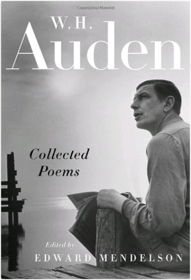 This volume includes all the poems that Auden wished to preserve, in a text that includes his final revisions, with corrections based on the latest research. Auden divided his poems into sections that corresponded to what he referred to as chapters in his life, each one beginning with a change in his inner life or external circumstances: the moment in 1933 when he first knew “exactly what it means to love one’s neighbor as oneself”; his move from Britain to America in 1939; his first summer in Italy in 1948; his move to a summerhouse in Austria in 1958; and his return to England in 1972. Auden’s work has perhaps the widest range and the greatest depth of any English poet of the past three centuries. From the anxious warnings of his early verse through the expansive historical perspectives of his middle years to the celebrations and thanksgiving in his later work, Auden wrote in a voice that addressed readers personally rather than as part of a collective audience. His styles and forms extend from ballads and songs to haiku and limericks to sonnets, sestinas, prose poems, and dozens of other constructions of his own invention. His tone ranges from spirited comedy to memorable profundity–often within the same work. His poems manage to be secular and sacred, philosophical and erotic, personal and universal. “All the poems I have written were written for love,” Auden once said. This book includes his famous early poems about transient love (“Lay your sleeping head, my love,” “Stop all the clocks, cut off the telephone”) and his later poems about enduring love (“In Sickness and in Health,” “First Things First”). The book also includes Auden’s longer, more thematically varied poems, from the expressionist charade “Paid on Both Sides” to the formal couplets of “New Year Letter”; the darkly comic sequel to The Tempest, “The Sea and the Mirror”; and a baroque eclogue set in a wartime bar, “The Age of Anxiety.” This new edition includes a critical appreciation of Auden by Edward Mendelson, the editor of the present volume and Auden’s literary executor. “W. H. Auden had the greatest gifts of any of our poets in the twentieth century, the greatest lap full of seed.” –James Fenton, The New York Review of Books “At the beginning of the new century, [Auden] is an indispensable poet. Even people who don’t read poems often turn to poetry at moments when it matters, and Auden matters now.” –Adam Gopnik, The New Yorker The Complete Works of W. H. Auden: Poems, Volume I: 1927–1939 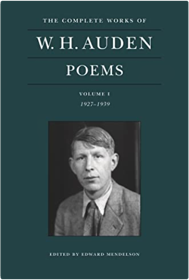 The Complete Works of W. H. Auden: Poems, Volume II: 1940–1973 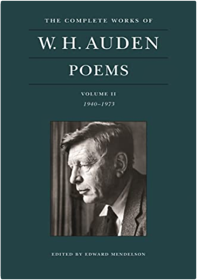 Lectures on Shakespeare 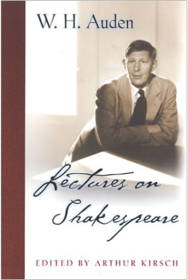 Nobody can accuse Auden of parroting the party line on this greatest of English writers. In one of the nuttier moments in the lecture series, in fact, he expressed his distaste for The Merry Wives of Windsor by declining to say a word about it—instead he simply played a recording of Verdi's Falstaff for the perplexed audience. Elsewhere his tendency was to view Shakespeare's creations as flesh-and-blood characters rather than poetic constructs: "If Antony and Cleopatra have a more tragic fate than we do, that is because they are far more successful than we are, not because they are essentially different." He's harder pressed to locate any success stories in Julius Ceasar: the protagonist strikes him as a fading despot, Octavius is "a very cold fish," and Cassius "a choleric man—a General Patton." And sometimes, as in this discussion of Falstaff's role in the double-decker Henry IV, Auden spins off his own freestanding riffs, which amount to short prose poems on Shakespearean themes: A fat man looks like a cross between a very young child and a pregnant mother. The Greeks thought of Narcissus as a slender youth, but I think they were wrong. I see him as a middle-aged man with a corporation, for, however ashamed he may be of displaying it in public, in private a man with a belly loves it dearly—it may be an unprepossessing child to look at, but he's borne it all by himself. Auden would return to the Bard's terrain many times in his career, most notably in "The Sea and the Mirror." But for sheer penetration and puckish humor, Lectures on Shakespeare is hard to beat, and demonstrates that for all their differences, both the speaker and his subject had a crucial thing in common—what Auden calls "a fabulously good taste for words." —James Marcus The Dyer's Hand 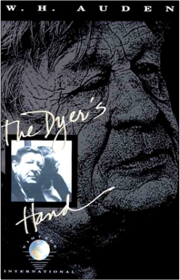 Auden: Poems (Everyman's Library Pocket Poets) 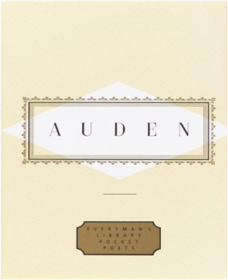 |


Delicious Library
Collection Total:
3,640 Items
3,640 Items
Last Updated:
Nov 2, 2025
Nov 2, 2025
 Made with Delicious Library
Made with Delicious Library